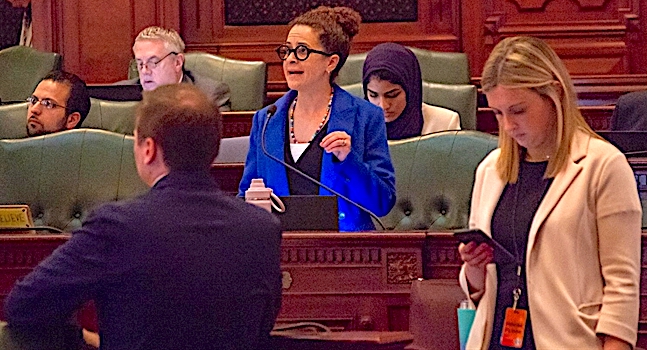As many Illinoisans struggle with food access, lawmakers consider state grants for grocers

SPRINGFIELD – Lawmakers are considering creating a grant program that would send state dollars to grocers in Illinois communities that have few options for buying food.
Senate Bill 850 would direct the state’s Department of Commerce and Economic Opportunity, or DCEO, to establish the “Grocery Initiative,” a program that would study “food deserts” in Illinois and provide grants to new or existing grocery stores in these areas. The grants would be available to grocery stores that are organized as independently owned for-profits, co-ops and nonprofit organizations as well as grocery stores owned by units of local government.
“It’s incredibly expensive to run a grocery store,” bill sponsor Rep. Mary Beth Canty, D-Arlington Heights, said in an interview. “It takes a lot of product and your margins are very thin.”
The initiative was first introduced in Gov. JB Pritzker’s proposed budget for the upcoming fiscal year, which called for $20 million to fund the program. Canty, who is sponsoring the proposal in the House, said she will continue to work on it in the next two weeks as lawmakers craft next year’s budget.
Canty said she views the proposal as a way to interrupt violence and alleviate some of the root causes of crime.
“Without food security, people are desperate and desperate people do desperate things,” Canty said.
The bill defines food deserts as low-income communities that are at least a half-mile from a grocery store in urban areas and at least 10 miles from a grocery store in rural areas.
Approximately 3.3 million people – about one in four Illinois residents – live in a food desert, according to a 2021 Illinois Department of Public Health report that used data from the United States Department of Agriculture. This dataset was first published in 2019 and was last updated in 2021.
The USDA also measures food access in communities using other thresholds. One-mile and 20-mile thresholds would still include 1.1 million Illinoisans – about 9 percent of the state’s population, according to that IDPH report.
Tito Quiñones, who works on legislative affairs for the DCEO, spoke to lawmakers at a hearing on the bill last week.
“This is a statewide issue and I think it connects different parts of the state over this issue of food insecurity,” Quiñones said.
According to a weekly survey from the U.S. Census Bureau that has tracked things like food insecurity since the start of the pandemic, about 9.4 percent of households in Illinois reported “sometimes” or “often” not having enough food to eat over a seven-day period early last month.
This figure is higher for people of color. About 14.4 percent of Hispanic and Latino households reported that level of food insecurity during the same period. About 18.5 percent of respondents who reported two or more races on the survey indicated they also struggled. For white households, the figure was 8 percent.
The proposal comes on the heels of the high-profile closings of four Walmart locations on Chicago’s South and West Sides as well as the controversial closing of a Whole Foods on the city’s South Side.
In more rural areas, when a grocery store closes, a store like Dollar General or Family Dollar might be a town’s only source of food other than a gas station. Dollar General reports they have more than 19,000 stores in 47 states.
The bill would require any grant recipients to carry a “substantial variety of perishable foods” including things like meat and fresh produce, items not typically carried by dollar stores or convenience stores.
Sean Park, a program manager at the Illinois Institute for Rural Affairs, spoke to lawmakers about the proposal at a House Revenue Committee hearing last week.
“If there was money to be made from the convenience stores doing this, they would already be doing it,” Park said, referring to selling meat and produce. “What we’re proposing in the bill is support for new models.”
Those new models might not need to rely as heavily on a profit motive for operating the grocery store. The bill would grant DCEO the authority to limit the kinds of grocers that would be eligible based on factors like annual revenue or physical size.
After the town of Winchester in west central Illinois lost its local IGA grocery store, residents had to travel around 20 miles to get groceries. In early 2017, civic leaders in the community began considering how to develop a grocery store for the town. The project eventually became Great Scott! Community Market.
“The need presented itself,” Thomas Coonrod, the general manager of the store, said in an interview. “The question became how to do it, the model, size, location.”
Planners settled on a co-op model, meaning the store is owned by its members, who bought into it as it was being developed, giving the store seed capital to get off the ground. Coonrod also said that the store has given local growers a place to sell their produce.
Other new models include municipally owned grocers. Over the past few years, this has been tried in a few communities in states such as Kansas and Florida. A municipally owned grocery store is under consideration in Cutler, a community of several hundred people in southern Illinois’ Perry County.
Some Republicans said they want to make sure the bill wouldn’t require any municipalities to use this model. In committee and in a follow-up interview, Canty clarified that no such requirement exists.
Rep. Martin McLaughlin, R-Barrington Hills, told his colleagues on the revenue committee that he was uncomfortable with the level of government intervention in the proposed program.
“This is unbelievable to me that we are going to suddenly be the financiers of the private capital market, which should be driving the decision,” McLaughlin said.
He later cited this concern as a reason that he couldn’t support the bill, comparing the idea to socialist nations that formerly made up the Soviet Union
The Illinois Fuel & Retail Association, a lobbying group representing convenience stores, is opposed to the bill as well, although that’s because those stores – which include gas station mini marts –would be excluded from grant eligibility under the legislation as currently written.
“Our ask is simple: to let convenience stores at least apply for some of this funding,” IFRA CEO Josh Sharp told lawmakers.
The state has been considering what to do about food deserts for several years. In 2017, the state began tracking the prevalence and locations of food deserts. Last year, Pritzker signed a bill that allowed DCEO and the Department of Agriculture to begin the process of creating a “Healthy Food Development Program,” which would offer financial assistance to grocery stores.
Miss Clipping Out Stories to Save for Later?
Click the Purchase Story button below to order a print of this story. We will print it for you on matte photo paper to keep forever.

